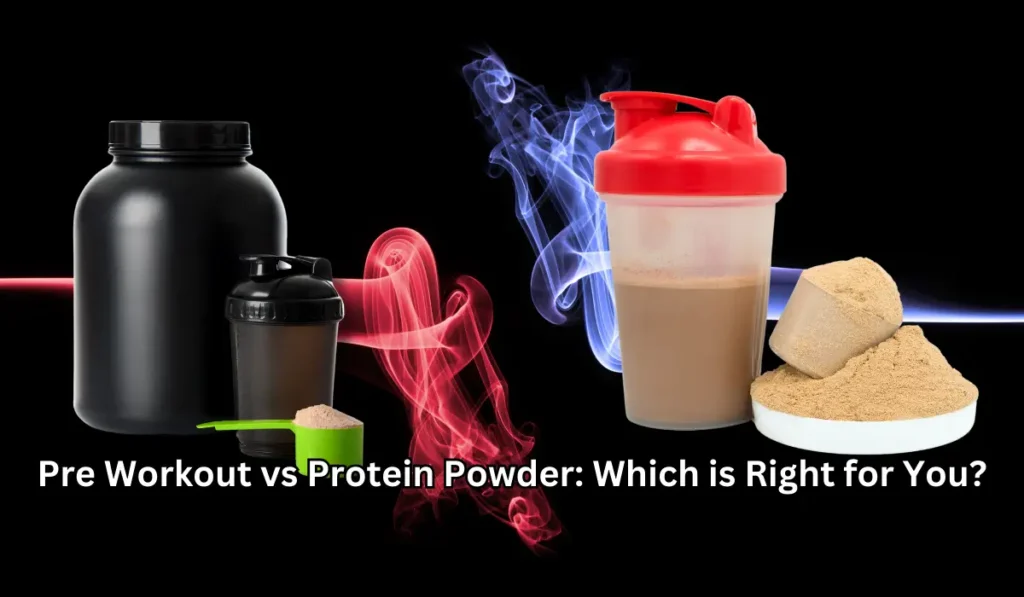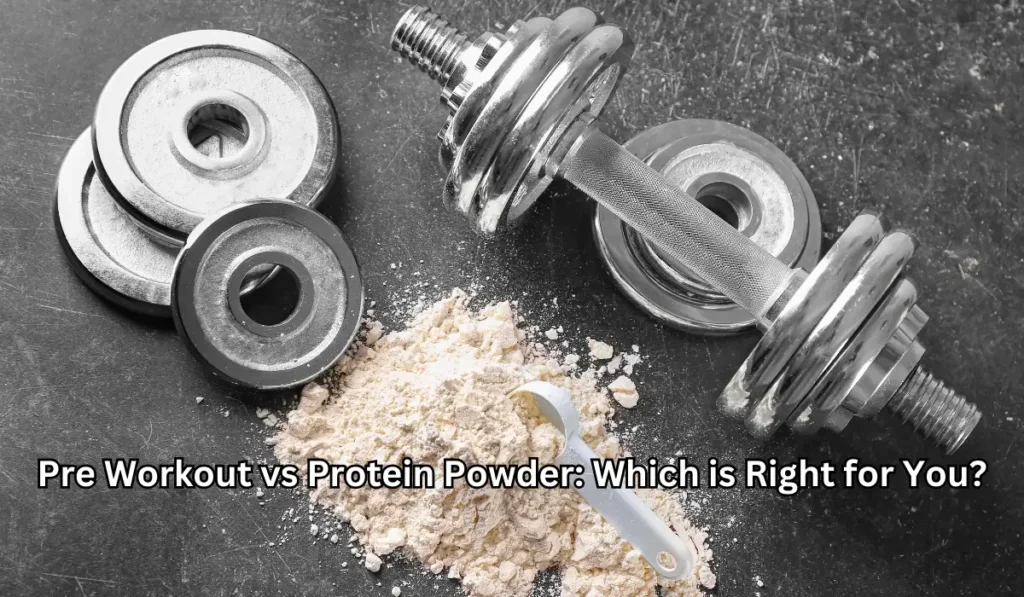
Pre Workout vs Protein Powder: Which is Right for You?
Are you looking to enhance your workout routine? Whether you’re a seasoned athlete or a beginner, there are a variety of supplements available that can help improve your performance and results. Two of the most popular supplements on the market are pre-workout and protein powder.
Pre-workout supplements are designed to help increase energy, focus, and endurance during workouts. They often contain ingredients such as caffeine, beta-alanine, and creatine, which can help improve athletic performance. On the other hand, protein powder supplements are used to support muscle growth and recovery, and are often taken post-workout. They can be made from a variety of sources, including whey, casein, and plant-based proteins.
But with so many options available, it can be tough to know which supplement is right for you. In this blog post, we’ll dive into the benefits of pre workout vs protein powder supplements, as well as the potential drawbacks. By the end, you’ll have a better understanding of which supplement is best suited to your fitness goals and lifestyle.
What is Pre Workout?
Pre-workout is a type of supplement that is taken before exercise to enhance athletic performance. It typically contains a blend of ingredients designed to increase energy, focus, and endurance during workouts. Pre-workout supplements often include ingredients such as caffeine, beta-alanine, creatine, and nitric oxide boosters.
Caffeine is a common ingredient in pre-workout supplements because it can help increase energy levels and improve focus. Beta-alanine is an amino acid that can help improve endurance by reducing fatigue during high-intensity exercise. Creatine is a substance found naturally in the body that can help improve strength and power. Nitric oxide boosters, such as citrulline or arginine, can help improve blood flow and oxygen delivery to muscles during exercise.
Pre-workout supplements are available in a variety of forms, including powders, capsules, and drinks. They are typically taken 30-45 minutes before exercise and can help you push through tough workouts and train at a higher intensity. However, it is important to be aware of the potential drawbacks of pre-workout supplements, such as jitters, crashes, and dependence. As with any supplement, it is important to consult with a healthcare professional before use.
Read about Gluten Free Pre Workout
What is a Protein Powder?
Protein powder is a dietary supplement that is commonly used to support muscle growth and repair. It is made from various protein sources, including whey, casein, and plant-based proteins such as soy, pea, or hemp. Protein powder supplements are usually sold in powdered form and can be mixed with water or other liquids to make a shake or smoothie.
Protein is an essential nutrient that is required for building and repairing muscle tissue. Athletes, bodybuilders, and people who engage in regular exercise often use protein powder supplements to help meet their daily protein needs. Protein powder supplements are also convenient for people who are on the go or have busy schedules and may not have time to prepare a protein-rich meal.
Whey protein is the most commonly used protein powder supplement and is derived from milk. It is a complete protein, meaning it contains all of the essential amino acids needed by the body. Casein protein is another milk-based protein that is slower-digesting than whey, which makes it a good option for use before bed. Plant-based protein powders are also popular and can be a good option for vegetarians and vegans.
Protein powder supplements can help support muscle growth and repair, aid in post-workout recovery, and improve overall athletic performance. However, it is important to remember that protein supplements should not be used as a replacement for a balanced diet, and should be consumed as part of a healthy and balanced lifestyle.

Pre-Workout Supplements Overview
Benefits of pre-workout supplements
Pre-workout supplements are designed to help enhance your workout performance by providing an energy boost, improving focus, and increasing endurance. By taking pre-workout supplements before your workout, you may be able to push yourself harder, train at a higher intensity, and ultimately see better results.
One of the main benefits of pre-workout supplements is increased energy. Many pre-workout supplements contain caffeine, which can help increase alertness and reduce fatigue. This can be especially beneficial if you are working out early in the morning or after a long day at work.
Another benefit of pre-workout supplements is improved focus. Some pre-workout supplements contain ingredients that can help improve cognitive function and mental clarity, which can help you stay focused and motivated throughout your workout.
Pre-workout supplements can also help increase endurance by delaying the onset of fatigue. Beta-alanine is a common ingredient in pre-workout supplements that can help improve endurance by reducing the build-up of lactic acid in the muscles. This can allow you to train at a higher intensity for longer periods of time.
Common ingredients
Pre-workout supplements often contain a blend of ingredients designed to enhance athletic performance. Some of the most common ingredients found in pre-workout supplements include:
- Caffeine: A stimulant that can help increase energy and improve focus. Caffeine is often found in coffee, tea, and chocolate, as well as pre-workout supplements.
- Beta-alanine: An amino acid that can help reduce fatigue and improve endurance by buffering lactic acid in the muscles.
- Creatine: A naturally occurring compound found in the body that can help improve strength and power.
- Nitric oxide boosters: Ingredients such as citrulline or arginine that can help improve blood flow and oxygen delivery to muscles during exercise.
- B-vitamins: Essential vitamins that play a role in energy metabolism and can help support overall energy levels.
While these ingredients can be effective in enhancing athletic performance, it is important to be aware of the potential side effects and to use pre-workout supplements as directed.
Potential drawbacks
While pre-workout supplements can be effective in enhancing athletic performance, there are potential drawbacks to be aware of.
One potential drawback is the risk of side effects. Some people may experience jitters, anxiety, or difficulty sleeping due to the caffeine content in pre-workout supplements. Beta-alanine can also cause a tingling sensation in the skin, which some people may find uncomfortable.
Another potential drawback is dependence. If you rely on pre-workout supplements to get through your workouts, you may find it difficult to train without them. This can lead to a reliance on supplements rather than focusing on building a strong foundation through proper nutrition and exercise.

Protein Powder Supplements Overview
Benefits of protein powder supplements
Protein is an essential nutrient that is required for building and repairing muscle tissue. Athletes, bodybuilders, and people who engage in regular exercise often use protein powder supplements to help meet their daily protein needs.
One of the main benefits of protein powder supplements is muscle growth and repair. When you exercise, your muscles undergo stress and damage, which can be repaired and strengthened through proper nutrition and recovery. Consuming protein powder supplements after a workout can help provide your muscles with the necessary amino acids needed for repair and growth.
Protein powder supplements can also aid in post-workout recovery by reducing muscle soreness and inflammation. This can help you recover faster and get back to training sooner.
Read about Best Vegan Pre Workout
Types of protein powders
Protein powder supplements are available in a variety of forms, including whey, casein, and plant-based proteins such as soy, pea, or hemp. Each type of protein has its own unique benefits and drawbacks.
Whey protein is the most commonly used protein powder supplement and is derived from milk. It is a complete protein, meaning it contains all of the essential amino acids needed by the body. Whey protein is also quickly absorbed by the body, making it a good option for post-workout recovery.
Casein protein is another milk-based protein that is slower-digesting than whey. This means that it can provide a more sustained release of amino acids over a longer period of time. Casein protein is often used as a bedtime snack to support muscle growth and recovery during sleep.
Plant-based protein powders are also popular and can be a good option for vegetarians and vegans. Some of the most common plant-based protein sources include soy, pea, rice, and hemp. Plant-based protein powders can be just as effective as animal-based protein powders, but it is important to choose a high-quality product that provides all of the essential amino acids.
How to choose the right protein powder for your needs
When choosing a protein powder supplement, it is important to consider your individual needs and preferences. Some factors to consider include:
- Protein source: Whey protein is a good option for most people, but if you are lactose intolerant or vegan, a plant-based protein powder may be a better choice.
- Taste and texture: Protein powders are available in a variety of flavors and textures, so it is important to choose one that you enjoy.
- Ingredients: Look for a protein powder that has a short list of ingredients and is free from unnecessary additives or fillers.
- Price: Protein powder supplements can vary widely in price, so it is important to choose one that fits your budget.
Comparing Pre Workout vs Protein Powder Supplements
While both pre-workout and protein powder supplements can be effective in supporting athletic performance and muscle growth, they serve different purposes and have unique benefits and drawbacks.
Pre-workout supplements are designed to be taken before exercise to enhance energy, focus, and endurance. They often contain caffeine and other stimulants that can help you push through tough workouts and train at a higher intensity. However, pre-workout supplements may also have potential drawbacks, such as jitters, crashes, and dependence.
Protein powder supplements, on the other hand, are used to support muscle growth and recovery after exercise. They can help provide the necessary amino acids needed for repair and growth, and can aid in post-workout recovery. However, protein powder supplements are not designed to enhance energy or performance during exercise.
When deciding between pre-workout and protein powder supplements, it is important to consider your individual needs and goals. If you are looking to enhance your athletic performance and energy levels during exercise, a pre-workout supplement may be a good option. If your goal is to support muscle growth and recovery, a protein powder supplement may be more appropriate.
Conclusion: Pre Workout vs Protein Powder – Which is Right for You?
Choosing between pre workout vs protein powder supplements ultimately depends on your individual needs and fitness goals.
If you are looking to enhance your energy levels, focus, and endurance during exercise, a pre-workout supplement may be a good option. Pre-workout supplements can help you push through tough workouts and train at a higher intensity. However, it is important to use pre-workout supplements responsibly and to be aware of the potential side effects and dependence.
If your goal is to support muscle growth and recovery, a protein powder supplement may be more appropriate. Protein powder supplements can help provide the necessary amino acids needed for muscle repair and growth, and can aid in post-workout recovery. However, protein powder supplements should not be used as a replacement for a balanced diet and exercise routine.
It is important to consider the potential benefits and drawbacks of each supplement, and to consult with a healthcare professional before starting any new supplement regimen. Ultimately, the best supplement for you will depend on your individual needs, goals, and preferences. By choosing the right supplement and using it responsibly, you can support your fitness journey and see better results.